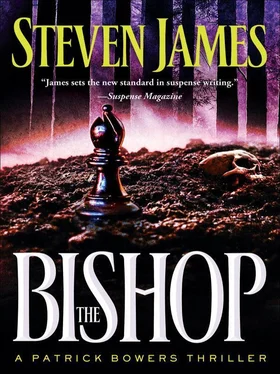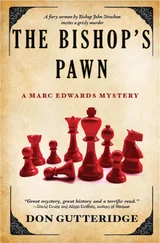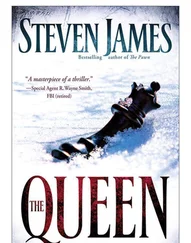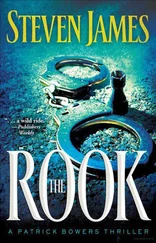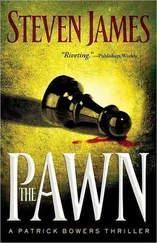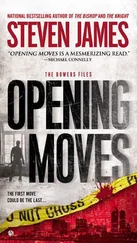Steven James - The Bishop
Здесь есть возможность читать онлайн «Steven James - The Bishop» весь текст электронной книги совершенно бесплатно (целиком полную версию без сокращений). В некоторых случаях можно слушать аудио, скачать через торрент в формате fb2 и присутствует краткое содержание. Жанр: Полицейский детектив, на английском языке. Описание произведения, (предисловие) а так же отзывы посетителей доступны на портале библиотеки ЛибКат.
- Название:The Bishop
- Автор:
- Жанр:
- Год:неизвестен
- ISBN:нет данных
- Рейтинг книги:4 / 5. Голосов: 1
-
Избранное:Добавить в избранное
- Отзывы:
-
Ваша оценка:
- 80
- 1
- 2
- 3
- 4
- 5
The Bishop: краткое содержание, описание и аннотация
Предлагаем к чтению аннотацию, описание, краткое содержание или предисловие (зависит от того, что написал сам автор книги «The Bishop»). Если вы не нашли необходимую информацию о книге — напишите в комментариях, мы постараемся отыскать её.
The Bishop — читать онлайн бесплатно полную книгу (весь текст) целиком
Ниже представлен текст книги, разбитый по страницам. Система сохранения места последней прочитанной страницы, позволяет с удобством читать онлайн бесплатно книгу «The Bishop», без необходимости каждый раз заново искать на чём Вы остановились. Поставьте закладку, и сможете в любой момент перейти на страницу, на которой закончили чтение.
Интервал:
Закладка:
Split his loyalties, his priorities, use his love to divert him.
Don’t let him concentrate wholeheartedly on the hunt.
Brad picked the car’s lock and left the surprise behind.
Ever since arriving at the Library of Congress three hours ago, Tessa had been trying to figure out what it means to be human.
And it was not as easy as it might seem to find the answer.
And that was really starting to annoy her.
She glanced at the pile of reference books around her and the notes she’d typed into her computer.
Okay, so first you had the religious party-line answer: created in the image of God.
But there was no real consensus, even among religious people, on what that meant-creativity, imagination, love, curiosity, dignity, freedom, responsibility… The list went on and on depending on which author you chose and on what he or she, a priori, seemed to feel was distinctive about Homo sapiens. So, circular reasoning.
Besides, it hadn’t taken her long to find out that the Bible never says humans are the only animals with consciousness or intelligence or emotions or politics or self-awareness or even the only creatures with a spirit.
That last one had surprised her.
She pulled up the verse she’d stumbled across while reading a church treatise from the nineteenth century-Ecclesiastes 3:20-21: “All go unto one place; all are of the dust, and all turn to dust again. Who knoweth the spirit of man that goeth upward, and the spirit of the beast that goeth downward to the earth?”
The spirit of man.
The spirit of the beast.
She’d wondered if “the beast” was like Satan or something, so she’d checked a couple other translations; most rendered the phrases “the spirits of man” and “the spirits of animals” or something very close.
People could interpret those verses however they wanted, but she figured that for now she would just take them at face value.
Animals have spirits.
People have spirits.
So, putting the whole “who has a spirit/soul” question aside, from a naturalistic point of view, humans are simply highly evolved apes who, at some point, acquired abstract thinking that facilitated language use and the eventual development of the societal expectations and behaviors we have today. So humans would not be essentially different from animals at all.
Different only by degree.
Not kind.
In fact, over the last hour she’d discovered that a growing number of bioethicists were abandoning the whole idea of “human,” arguing that it’s an artifice based on anthropocentrism and our vanity as a species. But anyone could see that as soon as you erase the uniqueness of humanity, you take away the basis for moral responsibility.
After all, chimpanzees aren’t held accountable for murdering their weak. Why should we be? Especially since, in the long run, it would only serve to help natural selection create a more vibrant and successful species?
But most of the atheists she was reading weren’t advocating murdering the weak.
Most.
She looked at the notes she’d scribbled.
Through the years, evolutionist thinkers like Hobbes, Huxley, Freud, who all held unflinchingly to natural selection, had inexplicably encouraged people to rise above their natural instincts, a view shared by atheist proselytizer Richard Dawkins: “In our political and social life we are entitled to throw out Darwinism, to say we don’t want to live in a Darwinian world.”
Okay, but how, if we’re the result of our genes, can we “throw out” being the result of our genes?
Talk about being illogical.
You can’t have it both ways-either we’re determined to be as we are by natural selection, or we’re not. And only if we’re not can we act in ways that are contrary to instinct. An animal constrained by instinct can’t suddenly decide to become something that instinct doesn’t allow it to be.
So, if natural selection really was natural and not somehow guided by God, the entire spectrum of human behavior would be natural. Instinctual. The good stuff and the bad stuff. All just part of being a highly evolved primate.
A species being true to itself.
People being true to their hearts.
To the fractures.
And the whole idea of “man’s inhumanity to man” would be a logical contradiction, because it would be impossible for a human to act in a nonhuman, or inhuman, way.
Chilling.
Bestiality, infanticide-just part of human nature.
Greed, cowardice, slavery-well, they must have had a beneficial role in survival or reproduction, or else natural selection would have weeded them out.
And from there things just got worse.
The entire field of medicine-the practice of keeping the sick and genetically deficient (whatever that might mean) alive as long as possible, is actually counterproductive to natural selection and the advancement of the species-especially considering the earth’s diminishing natural resources.
So why do it?
After all, natural selection requires the death of the weak for the good of the species, so why fight it?
What is good for the species is good.
What is bad for the species is bad.
Letting AIDS victims or starving children in Africa die would be moral. So would euthanizing the mentally or terminally ill. And since teenage girls are the most likely to reproduce, selective breeding and forced copulation with adolescent girls exhibiting genetically desirable traits would be acceptable, even desirable for the species.
Rape the gifted girls so the species might flourish.
It didn’t take much of a leap at all to conclude with Nietzsche: “Whoever must be a creator in good and evil, verily, he must first be an annihilator and break values. Thus the highest evil belongs to the highest goodness: but this is creative.”
Compulsory sterilization for mental patients, a la Woodrow Wilson’s polices in 1907. Genocide. Aborting kids with Down syndrome or cystic fibrosis. Physician-assisted suicide. Eugenics.
Why not?
Given the assertions of naturalism, all of this was logical, of course, but even most of the ardent naturalistic evolutionists she came across were reticent to go all the way down the eugenics road.
In fact, most of them were, ironically, strong advocates for social justice and medical advances, which, considering their assumptions about human origins, didn’t really make any sense.
But she actually gave those authors a lot of credit though, because even if they weren’t intellectually honest to their premises about human nature, they were honest to their hearts.
To the shell of good.
Because they knew what all people know-what even Hobbes, Huxley, Freud, and Dawkins knew-that some things are right and some are wrong, regardless of how beneficial or detrimental those things might be to our evolution as a species. Compassion trumps torture because compassion is good and torture is bad. Period.
But not everyone would be courageous enough to be that honest.
Nietzsche for example.
Or Hitler.
And that was the thing.
All it would take was the right person wielding the argument to the right people-She noticed the time.
1:56.
Dang.
Patrick was picking her up, like, any minute.
As much as she wanted to read more, she totally needed to get going.
She returned the books to the research librarian’s desk and hurried outside.
89
Tessa was waiting for me when I pulled up to the steps of the Library of Congress.
“How was your day?” I asked as she climbed into the car.
“I didn’t find what I was looking for. You?”
“No. Not yet.”
“How about that? We actually have something in common.”
Changing the subject, she told me she was starved, and since we still had a few minutes before we needed to be at Missy Schuel’s office, I drove toward food.
Читать дальшеИнтервал:
Закладка:
Похожие книги на «The Bishop»
Представляем Вашему вниманию похожие книги на «The Bishop» списком для выбора. Мы отобрали схожую по названию и смыслу литературу в надежде предоставить читателям больше вариантов отыскать новые, интересные, ещё непрочитанные произведения.
Обсуждение, отзывы о книге «The Bishop» и просто собственные мнения читателей. Оставьте ваши комментарии, напишите, что Вы думаете о произведении, его смысле или главных героях. Укажите что конкретно понравилось, а что нет, и почему Вы так считаете.
